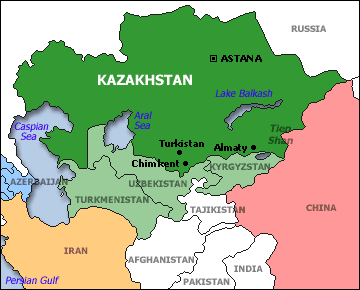 Kazakhstan's slowing economy is pinching the country's industrial heartland. Several industrial behemoths have announced cutbacks that they blame on a toxic mix of factors hitting their bottom lines, from falling commodity prices to an overvalued tenge. And as the enterprises pass the losses onto their workers, Astana is looking on anxiously, with memories of violent unrest in Kazakhstan's oil fields still fresh.
Kazakhstan's slowing economy is pinching the country's industrial heartland. Several industrial behemoths have announced cutbacks that they blame on a toxic mix of factors hitting their bottom lines, from falling commodity prices to an overvalued tenge. And as the enterprises pass the losses onto their workers, Astana is looking on anxiously, with memories of violent unrest in Kazakhstan's oil fields still fresh.
Copper producer KAZ Minerals (previously called Kazakhmys) announced on February 2 that it would temporarily shut down unprofitable operations and redeploy 2,000 employees to other projects—though it promised no "mass" job cuts for its staff of 60,000. Meanwhile, steel producer ArcelorMittal Temirtau slashed salaries in January, reducing local staff pay by a quarter and cutting expatriate salaries in half.
KAZ Minerals pointed the finger at "complicated economic conditions" mostly brought on by a fall in copper prices, while ArcelorMittal Temirtau blamed a cash shortage caused by "a complicated geopolitical situation" (shorthand for economic problems stemming from the conflict in Ukraine and western sanctions against Russia). ArcelorMittal also blamed the regional economic slowdown and an "unfavorable" sales market.
The company – owned by international steel giant ArcelorMittal – said it could not compete with Russian steel, which is cheaper following the dramatic fall in the value of the ruble.
Industrialists from car manufacturers to natural resources exporters have been complaining for months that the value of Kazakhstan's currency is eroding their competitive edge.
The tenge was devalued by 19 percent last February, but has shot back up against the ruble, making exports to Russia (a major market for Kazakhstan) uncompetitive, and causing some exporters to press for a fresh devaluation now.
ArcelorMittal promised to reimburse staff when the cash starts flowing again, but that did not stop the steelworkers' union from threatening to sue over the pay cuts at the company, which last year cut 1,000 jobs, leaving a workforce of around 13,000.
The prospect of industrial unrest in Kazakhstan's central and northeastern mining and metallurgy centers fills the administration of President Nursultan Nazarbayev (a former steelworker himself) with trepidation. Fatal clashes broke out between striking oil workers and security forces in Zhanaozen in 2011.
This time the government has been quick to step in, with Health and Social Protection Minister Tamara Duysenova warning ArcelorMittal it cannot just tear up contracts, and the prosecutor's office opening an inspection into whether the pay cuts were legal.
There are no reports of workers downing tools yet, but if they do the authorities are sure to wield the carrot as well as the stick, using a labor union law passed last year which employment rights activists criticized as restrictive; and a criminal code that came into force this year that further limits the right to strike.
Eurasianet.org




